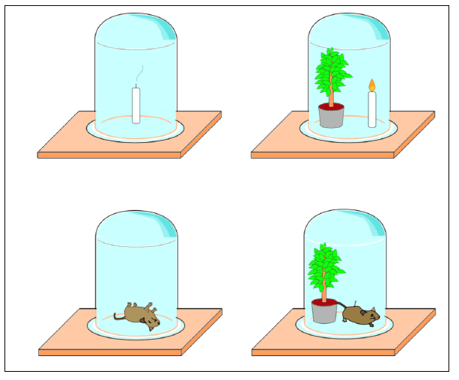Photosynthesis
Photosynthesis: Overview
This Topic covers sub-topics such as Leaf, Chloroplast, Structure of Chlorophyll, Nicotinamide Adenine Dinucleotide Phosphate, Factors Affecting Photosynthesis, Photosynthetic Pigments, Grana, Mechanism of Photosynthesis and, Site of Photosynthesis
Important Questions on Photosynthesis
Identify the given experiment:

State the hypothesis developed by Joseph Priestley from the experiment conducted on Mint plant.
In light reaction, the water molecule is split into hydrogen (H+) and hydroxyl ion (OH-) by the process called:
Chlorophyll is activated on exposure to light.
Adenosine Tri Phosphate (ATP) and _____ is produced at the end of the light reaction of photosynthesis. (Nicotinamide Adenine Dinucleotide Hydrogen Phosphate/Nicotinamide Adenosine Dinucleotide Hydrogen Phosphate)
What is assimilatory power in the light reaction of photosynthesis?
Identify incorrect statement/s related to Joseph Priestley experiment.
The site of photosynthesis in plants is called:
Chloroplast is the site where photosynthesis takes place.
Define photosynthesis and where it takes place.
Which experiment is done, to prove that sunlight is necessary to form starch.
To prove that _____ (sunlight/carbon dioxide) is necessary for plants during photosynthesis, a black paper experiment is done.
A Black-paper experiment is done to prove that carbon dioxide is necessary to form starch during photosynthesis.
Sunlight is necessary to form starch during photosynthesis. Please explain with the help of an experiment.
Thylakoids contain chlorophyll.
Define Chlorophyll and where it is found.
Chloroplast contains a pigment called:
Chlorophyll is found in _____ of the chloroplast.
Chromoplast absorbs sunlight for photosynthesis.
A pigment that helps in photosynthesis.
